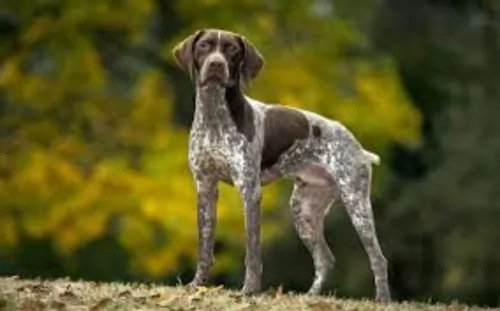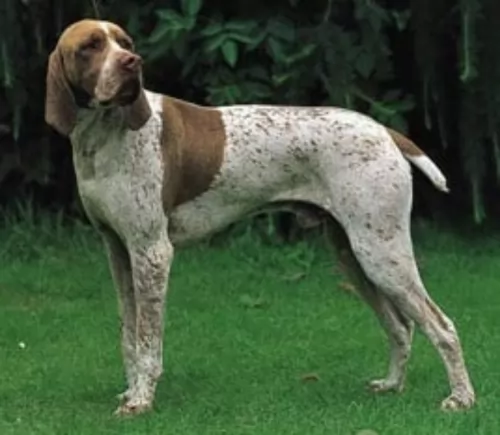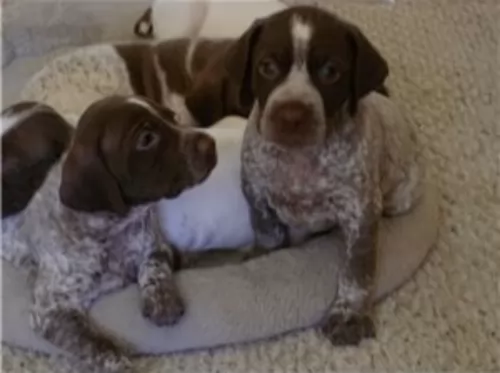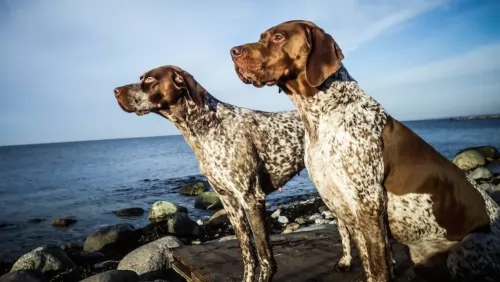 Petzlover
Petzlover Braque Francais (Gascogne Type) is originated from France but Keeshond is originated from Netherlands. Braque Francais (Gascogne Type) may grow 21 cm / 9 inches higher than Keeshond. Braque Francais (Gascogne Type) may weigh 14 kg / 31 pounds more than Keeshond. Both Braque Francais (Gascogne Type) and Keeshond has almost same life span. Both Braque Francais (Gascogne Type) and Keeshond has almost same litter size. Braque Francais (Gascogne Type) requires Low Maintenance. But Keeshond requires Moderate Maintenance
Braque Francais (Gascogne Type) is originated from France but Keeshond is originated from Netherlands. Braque Francais (Gascogne Type) may grow 21 cm / 9 inches higher than Keeshond. Braque Francais (Gascogne Type) may weigh 14 kg / 31 pounds more than Keeshond. Both Braque Francais (Gascogne Type) and Keeshond has almost same life span. Both Braque Francais (Gascogne Type) and Keeshond has almost same litter size. Braque Francais (Gascogne Type) requires Low Maintenance. But Keeshond requires Moderate Maintenance
 The Braques Français – Gascogne – is a hunting dog from southern France’s Gascony region. Known also as the French Gascony Pointer, this dog has descended from Spanish and Italian Pointers. The dog was saved from extinction at the turn of the 20th century.
The Braques Français – Gascogne – is a hunting dog from southern France’s Gascony region. Known also as the French Gascony Pointer, this dog has descended from Spanish and Italian Pointers. The dog was saved from extinction at the turn of the 20th century.
There are actually two breeds of Braque français, with the other being somewhat smaller and known as Braque français, type Pyrénées. Whichever one you have, they are popular hunting dogs in France. The first breed club was established in 1850.
 Keeshond is the term used for German Spitzes and although many American references have it that the Keeshond originated in the Netherlands, some say the dog originated in Germany and is a member of the German Spitz family.
Keeshond is the term used for German Spitzes and although many American references have it that the Keeshond originated in the Netherlands, some say the dog originated in Germany and is a member of the German Spitz family.
The Club for German Spitzes was founded in 1899. The Nederlandse Keeshond Club was formed in 1924. The Keeshond is also referred to as ‘The Smiling Dutchman’.
It was in the 17th and 18th centuries that the Keeshond was used greatly as a watchdog, appearing in England in the late 1800s, but after the turn of the 20th century, Mrs. Wingfield Digby of Dorset, England and Mrs. Alice Gatacre, a Dutch breed authority, living in England, stirred interest in the breed with their kennels.
An English breed Club was formed in 1926, and the first Keeshond was registered with The American Kennel Club in 1930.
 The Braque Francais is a dog which looks much like the German Short-haired Pointer. The Braque Francais (Gascogne) is a large breed dog, standing roughly 56 – 69cm. Weight is most times dependent on height, but the average weighs between 35 and 55 pounds. The dog is attractively lean and muscular and the tails have always been docked, although rules and regulations see the breed with a long tail these days. The natural tail of the Braque Francais is medium length. The eyes of this breed are brown or yellow and the ears are medium in length and floppy. The coat of the Gascogne is short and dense and in two colors – white and chestnut patching and mottling.
The Braque Francais is a dog which looks much like the German Short-haired Pointer. The Braque Francais (Gascogne) is a large breed dog, standing roughly 56 – 69cm. Weight is most times dependent on height, but the average weighs between 35 and 55 pounds. The dog is attractively lean and muscular and the tails have always been docked, although rules and regulations see the breed with a long tail these days. The natural tail of the Braque Francais is medium length. The eyes of this breed are brown or yellow and the ears are medium in length and floppy. The coat of the Gascogne is short and dense and in two colors – white and chestnut patching and mottling.
The dog is a keen tracker and is an excellent game and gun dog with some of them requiring more training than others. Training and socialization makes the Braque Francais an excellent, obedient pet who is eager to please and he is considered to be easily trainable, learning quickly. He loves his human family and is noted for his gentle, friendly nature, and he therefore makes and excellent family pet where there are children and other pets.
 The Keeshond is a medium-sized dog and a member of the Spitz group of dogs. He stands at 43 – 48cm in height and weighs 14 – 18kg.
The Keeshond is a medium-sized dog and a member of the Spitz group of dogs. He stands at 43 – 48cm in height and weighs 14 – 18kg.
He has a 2-layered, dense coat which is fairly long, straight and coarse and colors are grey, silver, black and cream. His undercoat is a very light cream color. He has erect ears, a fairly shop muzzle and a feathery, plumed tail which curves over his back.
The hair on his legs is fairly short accompanied with some feathering. A typical marking-feature of the Keeshond is the dark line which runs from the outer corner of each eye to the lower corner of each ear. It's what gives the dog his well known keeshond expression. The eyes of the dog are dark brown.
The Keeshond, just like other Spitz dogs, are playful, affectionate, friendly and eager to please. He is intelligent too and will respond well to training and socialization.
He makes a wonderful family pet as he is friendly and playful with children, loving all their games. He gets on well with other pets too. He is a social dog, thriving on being with his human family, wanting to participate in all family activities.
They are sensitive, loving pets and become very attached to their owners. They have even been used as comfort dogs in rescue situations, as they bond so well with people.
He makes a good watchdog too with his loud bark which he uses to deter intruders. He may well be a good watch- and guard dog but he isn't an aggressive dog.
 The attractive Braque Francais is a calm, contented dog who is also affectionate, social and intelligent. He is already a well mannered dog but will do even better with training and socialization. However, Braque Francais don’t take well to aggressive training and done the wrong way, the dog can end up being timid and confused.
The attractive Braque Francais is a calm, contented dog who is also affectionate, social and intelligent. He is already a well mannered dog but will do even better with training and socialization. However, Braque Francais don’t take well to aggressive training and done the wrong way, the dog can end up being timid and confused.
Wanting to please and being an intelligent dog, training should be fun, lighthearted but firm. In exchange you’re going to have an awesome friend from this wonderful, loving dog breed.
 The Keeshond, with his thick double coat, loves to be outdoors in cool weather. He won't be there too long however, because he will be missing his human family. He is such a social dog, craving human company and therefore isn't a dog to be put out in the backyard and left day after day.
The Keeshond, with his thick double coat, loves to be outdoors in cool weather. He won't be there too long however, because he will be missing his human family. He is such a social dog, craving human company and therefore isn't a dog to be put out in the backyard and left day after day.
He loves games and being totally involved with his human family. Look after your Keeshond well – he is a companion dog - and you will find him to be a most exceptional friend of yours.
 You won’t find many health issues with this active breed but nonetheless hip and joint issues will need to be watched. If you are considering a Braque Français puppy, you’ll want to be selective in choosing a responsible breeder. A healthy puppy with the right environment, can get to up to 15 years of age.
You won’t find many health issues with this active breed but nonetheless hip and joint issues will need to be watched. If you are considering a Braque Français puppy, you’ll want to be selective in choosing a responsible breeder. A healthy puppy with the right environment, can get to up to 15 years of age.
Ectropion and entropion in dogs affect their eyelids. Ectropion is where the eyelids roll outward, whereas entropion is where the eyelids curve inward, irritating the eye. Because visual and skeletal problems occur in this breed, it can be recommended that owners have their pets tested by both the Canine Eye Registration Foundation as well as the Orthopedic Foundation for Animals.
 With good food, fresh water, exercise and lots of interaction with your Keeshond, he can reach 12 to 14 years of age.
With good food, fresh water, exercise and lots of interaction with your Keeshond, he can reach 12 to 14 years of age.
No matter how healthy your dog is, he can still get ill, but the chances are less likely when he is feed nutritionally. Nonetheless look out for hip dysplasia, bloat, ear infections, skin rashes and eye diseases.
This is a problem in the lens of the eye. Your dog has a cloudy look to the eye. A cataract can occur when the cells are damaged. A disease such as diabetes can also cause a cataract and high blood sugar levels can change the metabolism of the cells in the lens.
The lens should be crystal clear, but with a cataract, the vision of the dog is obscured. It can cause blindness. Thankfully, cataracts aren't painful and most times dogs with cataracts can still see. There is the option of surgery to remove them too.
 Brushing the coat twice a week will get rid of loose hairs and maintain the sheen of the coat. Also, as a floppy eared breed, attention should be given to the ears to prevent infections. He will also need to have his teeth brushed with dog toothpaste and brush to prevent the build-up of damaging plaque and his nails will also require a clipping if they don’t manage to wear down naturally.
Brushing the coat twice a week will get rid of loose hairs and maintain the sheen of the coat. Also, as a floppy eared breed, attention should be given to the ears to prevent infections. He will also need to have his teeth brushed with dog toothpaste and brush to prevent the build-up of damaging plaque and his nails will also require a clipping if they don’t manage to wear down naturally.
Daily activity will be needed for this dog and he will want a walk every day. He certainly isn’t a dog you can leave indoors or outside in your backyard day after day. Any activities that require physical exertion will be good because they are exceptional athletes. If you are a cyclist or a runner, take him with you – he’ll love it.
Your Braque Francais loves energetic activities and for this he will require an excellent nutrient-rich diet. Nutrient-rich dog foods are higher in protein and fat and lower in carbohydrates. It’s important to check out the carbohydrate content in commercial dog foods to avoid those one high in carbohydrates.
Your vet can always advise you on a good quality food and you can always give him your own home-prepared foods which include rice, vegetables and meat. Certainly include some raw meat into his diet every now and then to avoid skin problems. Fresh, cool water must be available to him night and day.
 With his double coat, your Keeshond will need regular brushing to get rid of all those loose hairs. He is a dog which doesn't have that typical dog odor about him so bathing him is discouraged. Too much bathing irritates a dog's skin and dries it out.
With his double coat, your Keeshond will need regular brushing to get rid of all those loose hairs. He is a dog which doesn't have that typical dog odor about him so bathing him is discouraged. Too much bathing irritates a dog's skin and dries it out.
Check the inside of his mouth and make sure that his teeth are in a healthy state. If you are unsure, speak to your vet about dental hygiene as bad teeth won't only cause pain and discomfort for your pet, the teeth can affect his immune system and other body parts.
Check his claws too and have them cut when they become too long. When they are long they can hook on things and injure the sensitive area of the paws.
The Keeshond is a sturdy dog, loving all the activities and games that his family are involved in. He will love to be your walking companion and looks forward to his walk every day.
He is such a playful, adventurous dog and is always willing to join you in new games. Never put him in your back garden and forget about him, as this will make him ill and depressed. He must be part of the family to be healthy and happy and relies on you to include him in all your activities. He can live in the city or the countryside but will require being exercised wherever he is.
Top quality dry kibble will work for your Keeshond. If you want to keep him bright eyed and bushy tailed, mix in some quality home-made food too such as cooked chicken, rice and vegetables. You can also try to sometimes include a little bit of raw meat as well.
He is an active dog and will need a diet high in protein. Also, his thick coat needs to be maintained, and apart from regular brushing, look for quality dog foods that have Omega-3 fatty acids in them so as to maintain the skin and coat of the dog. Make sure he always has access to fresh, cool water.